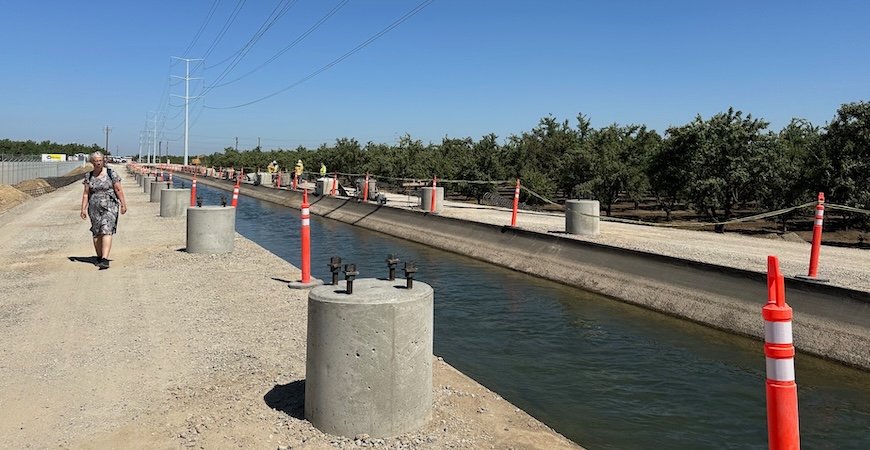
Construction has begun on a pilot project to install solar panels above two sections of Central Valley canals. This innovative initiative, which studies significant power and water issues, has already garnered recognition.
Project Nexus, a partnership between the Turlock Irrigation District (TID), the California Department of Water Resources (DWR), Bay Area development firm Solar AquaGrid, and UC Merced, received the Edmund G. "Pat" Brown Award from the California Council for Environmental and Economic Balance (CCEEB).
CCEEB describes itself as a "nonprofit, nonpartisan coalition of business, labor, and public leaders, which advances balanced policies for a healthy environment and a strong economy."
The award named after Brown, who was governor when the CCEEB was founded in 1973 and was a longtime champion of economic growth alongside environmental measures, is designed to recognize an individual or organization whose activities exemplify the principles of environmental and economic balance.
Concrete supports have been installed along one of the canal spans to anchor the solar panels. Data-gathering equipment also is in place. Full buildout is set to begin this fall, after the irrigation season, with completion anticipated in 2025.
Project Nexus, the first of its kind in the nation, emerged after Solar AquaGrid commissioned a study led by UC Merced researcher Brandi McKuin to predict the potential power generation and water savings from placing solar panels over canals. TID, providing both water and power to its customers, agreed to host the pilot project. DWR awarded $20 million in funding for the pilot project and is providing technical assistance to TID to study this project. The funding was allocated by Gov. Gavin Newsom and the State Legislature through 2021-22 state budget.
UC Merced researchers also are involved in a federal project to float solar panels in the Delta Mendota canal, announced by the Department of Interior in April.
"California is pioneering innovations to tackle our biggest challenges, and here in the Central Valley we're addressing two big challenges at the same time - generating clean electricity and conserving water," Newsom said at a press conference earlier this year where he announced the Department of Interior project and highlighted work done on Project Nexus, the state's effort. "Companies are coming to California because we're embracing innovation and we have the talent and infrastructure to foster new technologies that will solve not only California's, but the world's, biggest challenges."
Installing solar panels over irrigation canals has the potential to provide a multitude of benefits: generating renewable energy and reducing evaporation losses; increasing efficiency of and production from solar panels because of the cooling effect of the water beneath the panels; creating land savings for open space and agricultural use; reducing facility maintenance by mitigating algae and/or aquatic plant growth; and reducing the energy footprint and carbon emissions required to operate and maintain the facility.
In accepting the award, TID General Manager Brad Koehn acknowledged the importance of the project not just statewide but globally, as others could look to replicate it.



